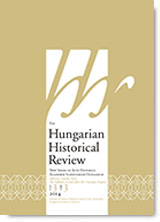The Roles and Loyalties of the Bishops and Archbishops of Dalmatia (1102–1301)
The Roles and Loyalties of the Bishops and Archbishops of Dalmatia (1102–1301)
Author(s): Judit GálSubject(s): History
Published by: Magyar Tudományos Akadémia Bölcsészettudományi Kutatóközpont Történettudományi Intézet
Keywords: Church history; Dalmatia; roles of bishops; Kingdom of Hungary; royal policy
Summary/Abstract: This paper deals with the roles of archbishops and bishops of Dalmatia who were either Hungarian or had close connections with the Hungarian royal court. The analysis covers a relatively long period, beginning with the coronation of Coloman as king of Croatia and Dalmatia (1102) and concluding with the end of the Árpád dynasty (1301). The length of this period not only enables me to examine the general characteristics of the policies of the court and the roles of the prelates in a changing society, but also allows for an analysis of the roles of the bishopric in different spheres of social and political life. I examine the roles of bishops and archbishops in the social context of Dalmatia and clarify the importance of their activities for the royal court of Hungary. Since the archbishops and bishops had influential positions in their cities, I also highlight the contradiction between their commitments to the cities on the one hand and the royal court on the other, and I examine the ways in which they managed to negotiate these dual loyalties. First, I describe the roles of the bishops in Dalmatian cities before the rule of the Árpád dynasty. Second, I present information regarding the careers of the bishops and archbishops in question. I also address aspects of the position of archbishop that were connected to the royal court. I focus on the role of the prelates in the royal entourage in Dalmatia, their importance in the emergence of the cult of the dynastic saints, and their role in shaping royal policy in Dalmatia. I concentrate on the aforementioned bishops, but in certain cases, such as the examination of the royal entourage or the spread of cults, I deal with other, non-Hungarian bishops of territories that were under Hungarian rule. This general analysis is important because it provides an opportunity for a more nuanced understanding of the bishopric role and helps highlight the importance of the Hungarian bishops, who constitute the main subject of this essay.
Journal: The Hungarian historical review : new series of Acta Historica Academiae Scientiarum Hungaricae
- Issue Year: 3/2014
- Issue No: 3
- Page Range: 471-493
- Page Count: 23
- Language: English

